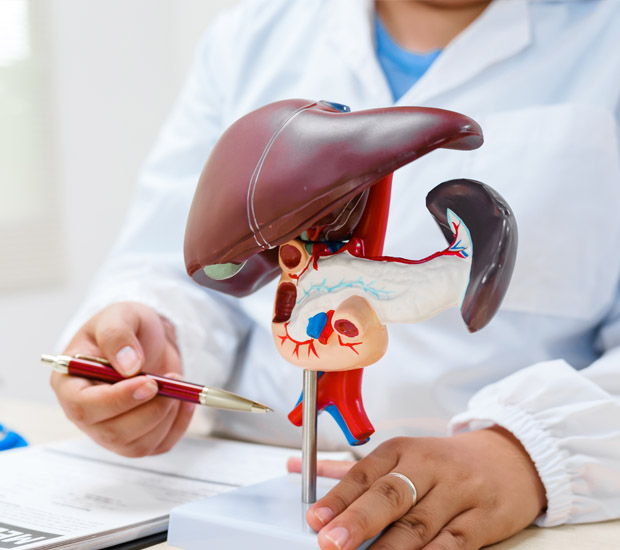Liver Disease SpecialistForest Hills, NY
A liver disease specialist focuses on diagnosing, treating, and managing a variety of liver disorders, such as hepatitis, fatty liver disease, and liver cancer. The human liver is an essential part of the body that processes nutrients, detoxifies harmful substances, and produces everyday proteins. However, compromised liver function can lead to serious health issues if left untreated.
Pinnacle Gastroenterology treats liver disease in the Forest Hills area. We are here to provide you with the comprehensive care you need to keep your liver healthy and functioning. Call our office at (718) 747-9630 to learn more about our services or to schedule an appointment.
Understanding Liver Disease
As the largest organ in the human body, the liver is an essential part of everyday function that performs a variety of tasks. This organ is necessary to digest food, rid the body of harmful waste products, and make clotting factors that keep the blood flowing well. However, liver disease can affect the organ and how it functions.
Many diseases and lifestyle habits can affect the function and health of the liver, including:
- Infection from hepatitis A, B, and C
- Nonalchoholic fatty liver disease
- Alpha-1 antitrypsin deficiency.
- Metabolic syndrome
- Excessive alcohol consumption
- Using intravenous drugs
- Liver cancer
According to the Cleveland Clinic, liver disease affects 1.8% of adults in the United States, or 4.5 million people. Liver disease leads to 57.000 deaths per year. Death from liver disease is rare, often occurring due to complications of liver failure. However, there are cases of people dying due to acute liver failure. Men are twice as likely to be affected by liver disease than women.
“According to the Cleveland Clinic, liver disease affects 1.8% of adults in the United States, or 4.5 million people.”
What Liver Disease Specialists Do
A liver disease specialist, also known as a gastroenterologist, can diagnose and treat diseases affecting the liver. In many cases, they can also address conditions affecting the surrounding organs, such as the gallbladder, bile ducts, and pancreas. This is known as the biliary tract.
These medical specialists undergo additional training after medical school and a three-year residency program. They complete a three-year fellowship in gastroenterology, which includes the study of the liver (hepatology). Some liver disease specialists attend another year in a hepatology fellowship to further their understanding of conditions that affect the liver. In other words, all hepatologists are gastroenterologists, but not all gastroenterologists become hepatologists.
“A liver disease specialist, also known as a gastroenterologist, can diagnose and treat diseases affecting the liver.”
When to Consult a Liver Disease Specialist
Liver disease does not always cause symptoms that patients can see or feel. Many people do not know that their liver function is beginning to decline until its later stages. That being said, there are signs that they should be aware of, such as:
- Yellowing in the skin and eyes (jaundice)
- Upper abdominal pain
- Itchy skin with no rash
- Swelling in the legs and ankles
- Dark urine or pale stool
- Persistent fatigue
- Nausea or vomiting
- Bruising or bleeding easily
Additionally, if the patient has risk factors such as a family history of liver disease, type 2 diabetes, or consumes moderate to heavy amounts of alcohol, they should seek professional diagnosis and treatment from a liver disease specialist.
“Many people do not know that their liver function is beginning to decline until its later stages.”
Diagnosing Liver Disease
Finding the root cause of liver disease can help the doctor determine the best course of treatment, preventing further damage and improving the patient’s health outcomes. They often begin with a complete health history and physical exam. They may recommend blood tests to measure the liver enzymes, proteins, and bilirubin levels. They may look for changes in the patient’s genes.
The doctor may also utilize imaging tests like CT or MRI scans. These tests can reveal inflammation and swelling, as well as the extent of the liver disease. The liver disease specialist may use elastography and endoscopy for a more in-depth picture of the patient’s liver. An elastograph uses ultrasound or MRI technology to measure the level of stiffness (fibrosis) in the liver. Meanwhile, an endoscopy is where the doctor uses a small camera (endoscope) to pass through the patient’s upper GI tract, giving a clearer view of their bile ducts.
Sometimes, the liver disease specialist may recommend a tissue sample, also known as a biopsy. During this procedure, they will use a long needle to put through the patient’s skin. They will then send the sample to a lab for testing. A liver biopsy can check for cancer or confirm cirrhosis.
“Finding the root cause of liver disease can help the doctor determine the best course of treatment, preventing further damage and improving the patient’s health outcomes.”
Treatment Options by a Liver Disease Specialist
There are several treatment options that liver disease specialists can utilize. Some types of liver disease have specific medical treatments that can prevent further damage. For example, antiviral medications can treat infections caused by viral hepatitis. Meanwhile, corticosteroids and immunosuppressants can address autoimmune-related liver disease.
It is important to note that lifestyle changes are often the primary treatment for liver disease. Reducing the toxic workload on the liver can help avoid complications from any type of liver disease, particularly those caused by excess fat, heavy alcohol consumption, and exposure to other toxins. In these cases, the liver disease specialist may recommend losing weight or quitting the use of alcohol.
Advanced liver disease may require additional medication or surgery if less invasive methods have not worked. For liver disease that leads to liver failure, the patient may require a liver transplant.
“It is important to note that lifestyle changes are often the primary treatment for liver disease.”
Questions Answered on This Page
Q. What is the role of a liver disease specialist?
Q. When do I need professional treatment for liver disease?
Q. What tools do liver disease specialists use?
Q. What kind of treatments do liver disease specialists provide?
Frequently Asked Questions
Q. What are the symptoms of liver disease?
A. Liver disease symptoms can vary widely from person to person. Early signs of liver disease include fatigue, loss of appetite, nausea, and abdominal pain. As the condition progresses, you may get jaundice (yellow skin and eyes) and swelling in your abdomen or legs. However, some individuals may not experience any symptoms until the disease has significantly progressed.
Q. Can liver disease be reversed or cured?
A. According to the Liver Foundation, liver damage can be reversed, as the liver is the the only organ to repair itself by naturally regenerating new tissue. Some conditions, such as early-stage fatty liver disease or hepatitis C, can be improved or reversed with appropriate treatment. However, other conditions like cirrhosis may require long-term treatment to slow its progression and reduce potential complications. It is never too late to ask for help.
Q. Is liver disease always caused by alcohol use?
A. A leading cause of liver disease is alcohol use. However, many types of liver disease have no link to alcohol. Conditions like nonalcoholic fatty liver disease (NAFLD), viral hepatitis, autoimmune hepatitis, and genetic disorders can all lead to liver damage.
Q. Can liver disease increase the risk of other health issues?
A. Yes, chronic liver disease can raise the risk of other health complications such as internal bleeding, fluid retention, kidney issues, and even liver cancer. Early diagnosis and regular follow-up care can help you manage potential risk factors and maintain your overall health. Give our Forest Hills office a call to learn more.
Q. When should I consult a liver disease specialist instead of my primary care physician?
A. Primary care providers will often refer their patients to a liver disease specialist when blood tests show abnormal liver enzyme levels or liver disease symptoms. In other cases, they may also refer to a specialist after they confirm that the patient has chronic liver disease. We will work with you and your primary care provider to ensure you receive comprehensive care and treatment tailored to your needs and goals.
Schedule an appointment at our Forest Hills office
A liver disease specialist can help you improve your health and overall quality of life. Pinnacle Gastroenterology treats a variety of liver diseases in Forest Hills and the surrounding area. Call our office at (718) 747-9630 to learn more about our services or to schedule an appointment.
Contact Us
Pinnacle Gastroenterology is located at
112-03 Queens Blvd Ste 204
Forest Hills,
NY 11375





